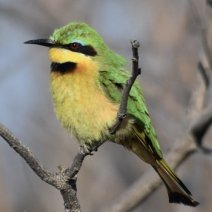Limited ecological opportunity influences the tempo of morphological evolution in birds
Jonathan P Drury, Julien Clavel, Joseph A Tobias, Jonathan Rolland, Catherine Sheard, Hélène Morlon
Abstract
According to classic models of lineage diversification and adaptive radiation, phenotypic evolution should accelerate in the context of ecological opportunity and slow down when niches become saturated.1,2 However, only weak support for these ideas has been found in nature, perhaps because most analyses make the biologically unrealistic assumption that clade members contribute equally to reducing ecological opportunity, even when they occur in different continents or specialize on different habitats and diets. To view this problem through a different lens, we adapted a new phylogenetic modeling approach that accounts for the fact that competition for ecological opportunity only occurs between species that coexist and share similar habitats and diets. Applying this method to trait data for nearly all extant species of landbirds,3 we find a widespread signature of decelerating trait evolution in lineages adapted to similar habitats or diets. The strength of this pattern was consistent across latitudes when comparing tropical and temperate assemblages. Our results provide little support for the idea that increased diversity and tighter packing of niches accentuates evolutionary slowdowns in the tropics and instead suggest that limited ecological opportunity can be an important factor determining the rate of morphological diversification at a global scale.
Curr Biol. 2024 Jan 4:S0960-9822(23)01755-4. doi : 10.1016/j.cub.2023.12.055.


